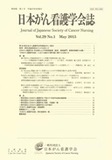Japanese
English
- 販売していません
- Abstract 文献概要
- 参考文献 Reference
- サイト内被引用 Cited by
要旨
【目的】M.Newman理論に基づいて,中年期進行肺がん患者と看護師が,パターン認識する過程を共に辿ることができたならば,患者の自分らしく生きることにどのような変化が表れるのかを探求する.
【方法】対象者は,医師が根治・延命の治療継続が困難と予測する,または遠隔転移がある肺がん患者4名.M.Newman理論を参考に看護介入を実施し,逐語録を分析した.
【結果】対象者は5つの局面を開示し,速やかな変化の過程を辿った.局面1:自分らしく生きてきた過去を振り返り,肺がんの進行で死を意識して自分らしく生きられない現況の表出,局面2:現在までの周囲の人間関係における本来の自分らしさの探求,局面3:人生の中心を占めてきた仕事や家庭生活を通して自己のパターン認識,局面4:肺がん体験を自分らしく生きる意味を見出し,将来への願望を表明,局面5:肺がんと共に在る自己を受容し,自分らしく生きることへ変容.
【結論】中年期進行肺がん患者が,パターン認識の過程で,肺がん体験を生きることに自己洞察や意味を見出し,未来に向けて自分はどう生きたいかを表明できることを示唆できた.
【Object】The purpose of this study is to explore what changes appear about the patients' own way to live, if advanced lung cancer patients of middle age and nurse were able to follow together pattern recognition based on the M.Newman theory.
【Method】Subject is lung cancer patient that physicians predict difficult to continue the curative treatment or he have distant metastases. The researcher conducted nursing intervention with reference to previous studies based on the M.Newman theory.
【Result】Patients revealed five aspects and followed a rapid process of change.
【Conclusion】This study was able to suggest that advanced lung cancer patients of middle age in the process of pattern recognition found meaning and self-insight through living with lung cancer and they can express how their hopes for the future.
Copyright © 2015, Japanese Society of Cancer Nursing All rights reserved.


